Offers and discounts

No Cost Emi available*On Purchase of Service worth 10,000 Rs. Or More |

Get a Website worth Rs. 24999/- for your Company in just 9999/-*(Powered by Gyan Uday Technology) |

GST InvoiceGet Gst Invoice & Claim Gst Credit for your Business with every Invoice |
Previously in India, there were only two forms of companies that can be formed under the Company Act.
Private Ltd Company: Generally, in a Private Ltd Company minimum of 2 Directors and 2 Members are compulsory.
Public Ltd Company: 3 Directors and a minimum of 7 members are essential criteria to form a Public Ltd Company.
But In the recent few years under Section 2(62) of the Company Act 2013, now anyone can form a new company with a minimum of one Director and one Member. This form of company is well known as a “one person company” (OPC). For the Incorporation of this form of company, one will have to follow fewer legal formalities in comparison to a Private Ltd Company. Now several businessmen who are unable to form a Private Ltd Company may be eager to know one person company meaning and the registration formalities required to form a “One Person Company”. Here you will get an answer to all these things.

The one who is going for one person company registration shall not be eligible to get incorporation for more than one such organization.
• The OPC's memorandum must show the name of a person who has his or her prior consent in the form, which will change from the OPC to a person when the proponent passes or becomes disabled on the contract.
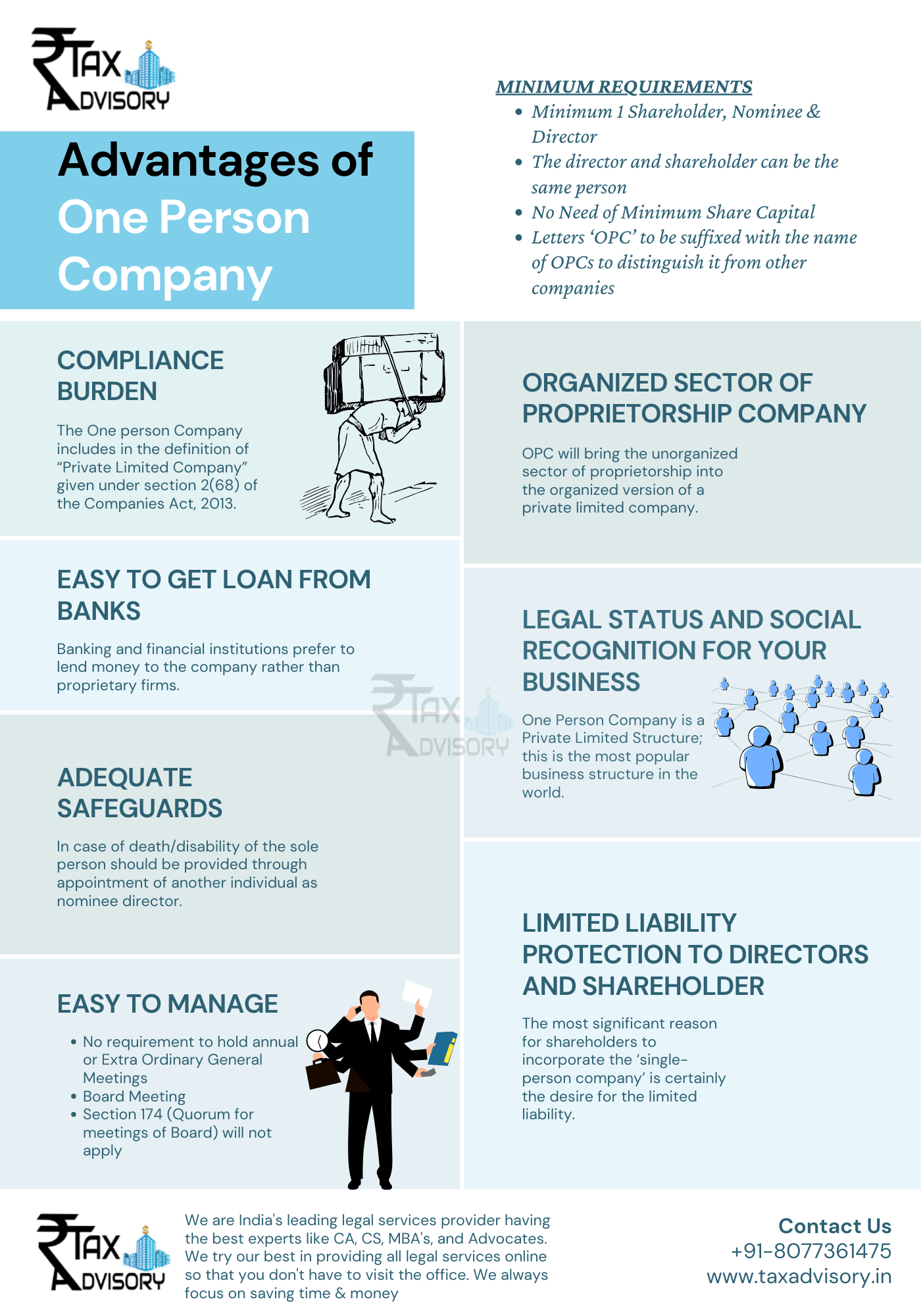
Buffer
In accordance with the Companies Act, the liability of the single shareholder in an OPC is limited to the unpaid subscription money in his/her name. This means that his/her personal belonging is completely safe from creditors of the business.
A Separate Legal Entity
One Person Company is a separate legal entity and capable of doing the whole thing that an entrepreneur would do.
Easy Funding
One person company in India is a private company; OPC can raise funds through venture capital, financial institutions, angel investors, etc. An OPC can raise funds thus graduating itself to a private limited company.
Benefits Under Income Tax Law
Any fee paid to the director will be allowed as a deduction under income tax law, unlike proprietorship. Further, benefits of presumptive taxation are also accessible subject to the income tax act.
Disadvantages of OPC
High Income Tax Rate
As a corporate form, you cannot avail the benefit of the tax slab advantage. In proprietary, you are required to pay according to your salary at 10%, 20%, or 30% tax rate. But in the case of OPC, you are directly charged 30% income tax. The high tax rate is a big drawback of a one-person company.
Consistency Cost
Compliance cost of partnership firm or proprietary is very low in comparison to One Person Company.
One Person Supervision
A shareholder is one, and that person makes all the decisions. On the off chance that he is insightful, it is excellent; however, in some cases, cross-check is required for business development. The company’s success and growth are all dependent on one person’s decision-making ability
Need for Change
An OPC company will only support small businesses. If the turnover of the company crosses ₹2 crores, on average, for three consecutive years, the OPC must alter to a private limited company, public limited company, or LLP.
Any person who wants to register a business as an “opc company” can easily register it by following the simple legal formalities given below: -
1. Firstly, one should procure the Digital Signature Certificate (DSC) of the prospective Director of the Company. For this purpose, the following documents are essential:
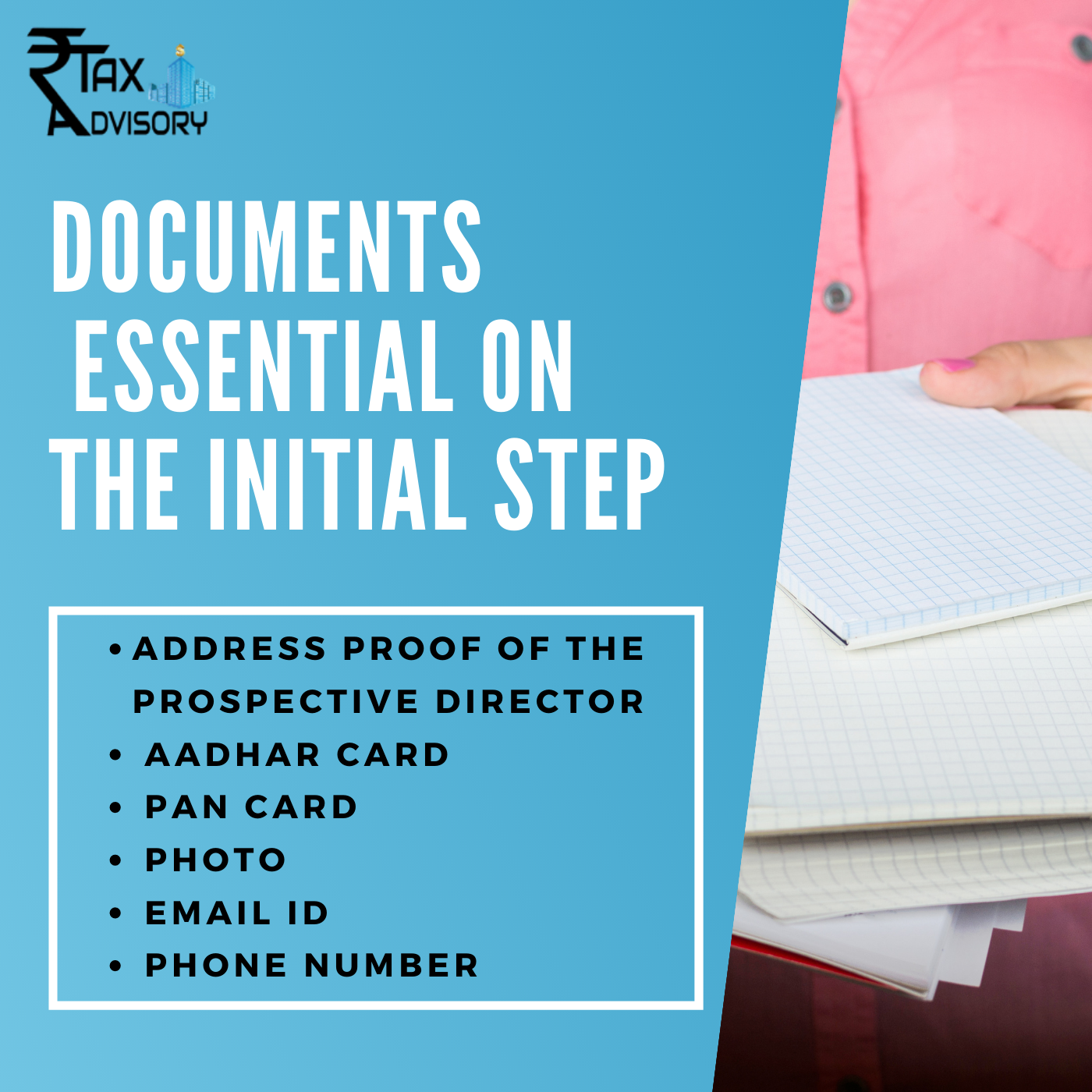
2. Secondly, apply for the DIN (Director Identification Number) of the prospective Director in SPICe Form along with the Name and Address Proof of the Director.
Note: Form DIR-3 is only available for companies existing in present times, since 2018. Now New Applicants who want to form a new OPC Company will not have to file a DIR-3 form additionally. Nowadays, DIN can be applied within the SPICe form for a maximum of 3 Directors.
Documents required to be submitted after registration of One Person Company
After completion of the above process to registering as an OPC Company following important document will have to be submitted to the Registrar Of The Company (ROC)-
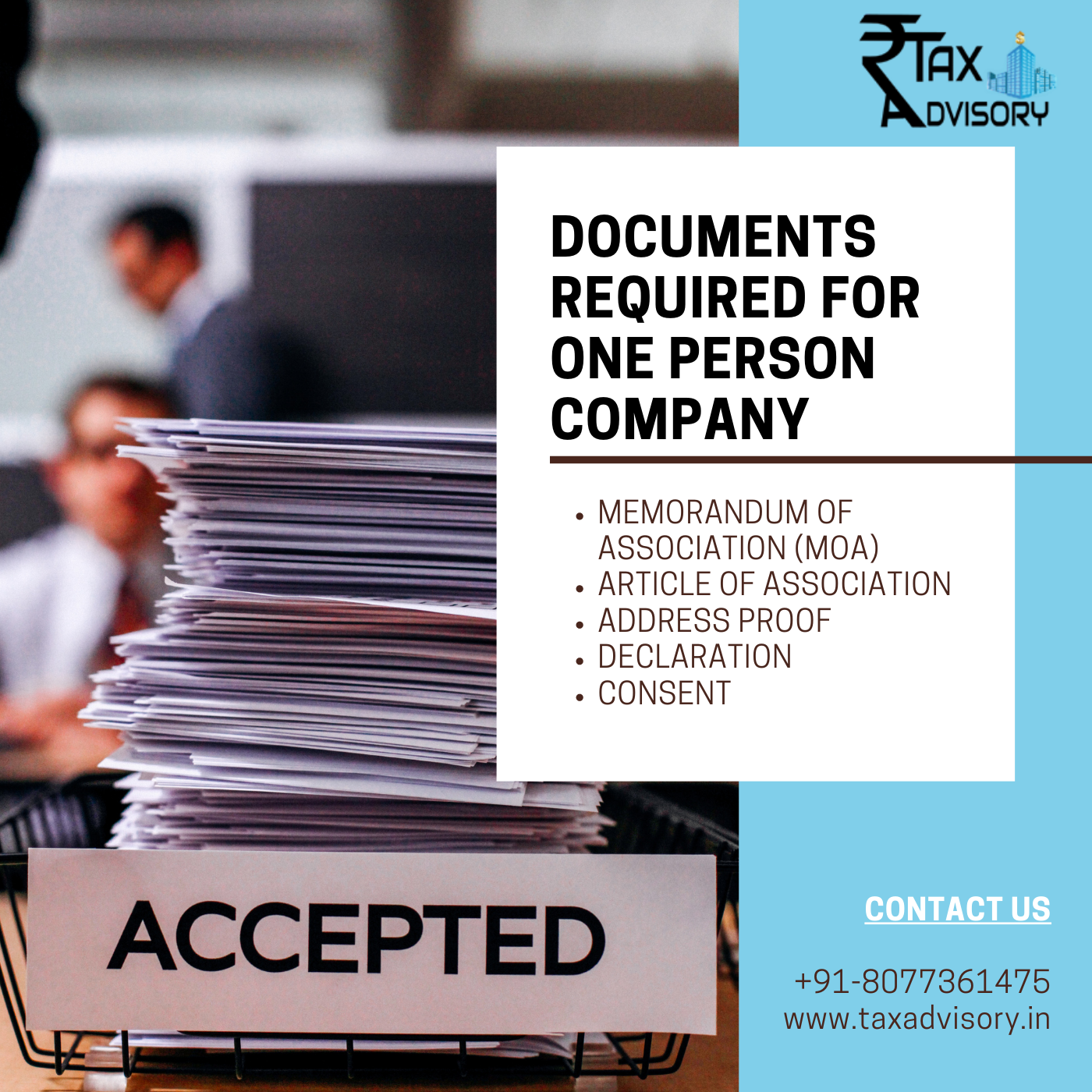
2. Article Of Association (AOA): The Article Of Association contains the By-Laws for the operation of this new OPC Company. Since in this new “One Person Company” (opc) there will be only 1 Director and only one member, A nominee is very essential for the Director, who will be responsible to perform the duties of the Director in case of any uncertainty like absence or unexpected death of the Director. For this purpose, the consent of the nominee should be taken in Form INC-3. A nominee must also provide his or her PAN CARD and Aadhar CARD
3. Address Proof: Address Proof of the Registered Office of this new OPC Company along with the proof of ownership or NOC from the owner is essential documents for incorporation of a new OPC Company.
Note: Declaration and consent of the prospective Director of the new OPC Company in form INC9 and DIR2 are essential to complete the registration process of a new OPC Company. Along with this declaration by a certifying profession that all formalities are done is also a required document to be submitted.
Now all these documents should be attached to the SPICe Form, SPICe-MOA, and SPICe AOA along with the Digital Signature Certificate of the prospective Director of this new OPC Company and certifying professional declaration should be uploaded to the website of MCA for approval as a new OPC Company. At the time of embodiment of the company, PAN and TAN numbers are automatically generated and filing of separate Application for PAN & TAN number is not required.
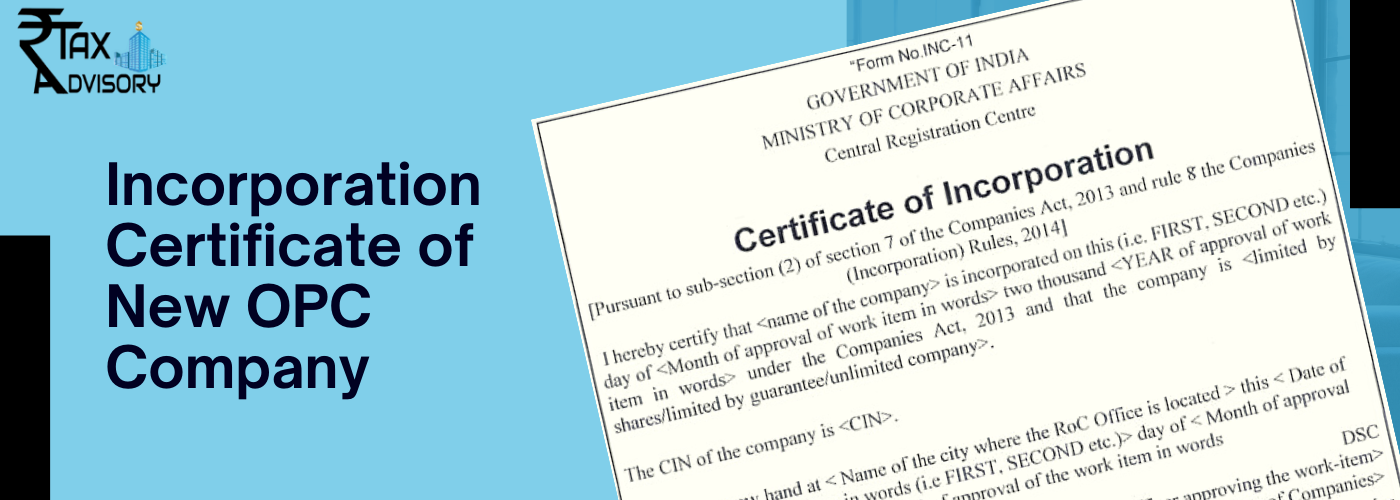
After verification of all essential documents, the Registrar of the Company will issue a certificate of incorporation to the newly formed “One Person Company” Now this newly formed OPC company can commence its business activities without any fear of legal formalities. If a person wants to operate his business as “One Person Company” and he or she has some questions in their mind. Here we are giving answers given by some well-known experts:
The main difference between a One Person Company and a Private Ltd Company are as follows-
• Private Ltd Company: This is an old form of company. Anyone can form a Private Ltd Company with a minimum of two directors and two members.
• One Person Company: This is a new type of company, where only having one director and one member is an essential criterion to form a Person Company.
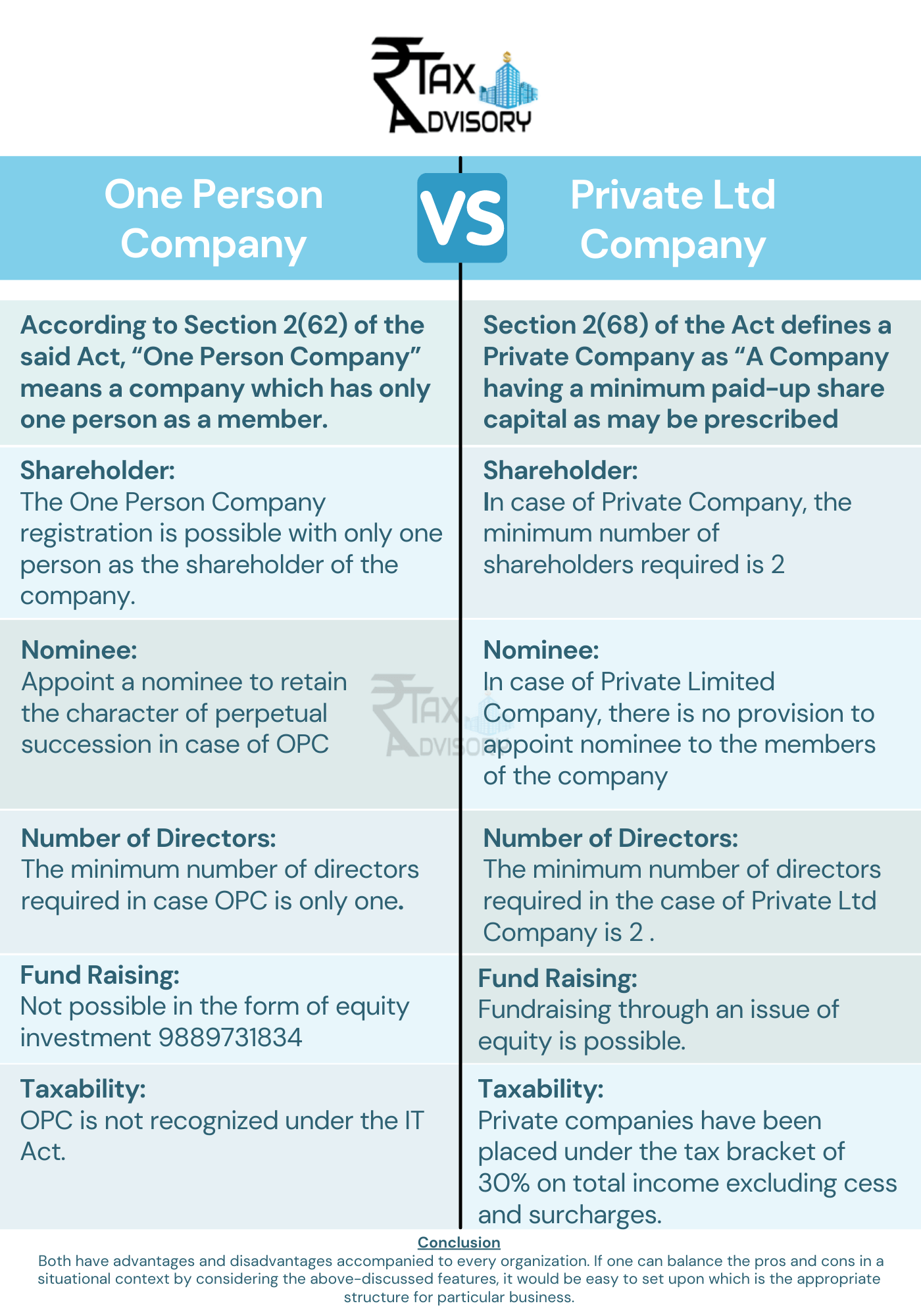
If you don’t want to take any type of stress due to lots of documentation and other legal services, then it is required to take the help of an expert. We are a large team of experienced professionals who can help you in completing all the things from beginning till end. Here you will get numerous benefits, some of these are as follows-

Team Tax Advisory will register your one person company in just-8999/-
Recent updates As of February 202
The Union Budget, Government has now removed the limit of paid-up share capital and turnover for the conversion of One Person Company that usually done by the start-ups.
Relaxing the eligibility of a person for such a company. Rule 3 of the Companies (Incorporation), 2014 provides that Only a natural person who is an Indian citizen and resident in India–
Shall be eligible to incorporate a One Person Company;
Has to be a nominee for the sole member of a One Person Company.
FAQs About OPC Company Registration
There is no particular tax advantage to an OPC Company as compared to other forms of companies whether it’s a private or public company. According to experts, The Tax rate for an OPC Company is 30% and some other tax provisions such as MAT & Dividend Distribution TAX are similar to private and public companies,
As a new OPC Company following legal formalities is necessary for while operations of the business:
If a person doing any type of business can easily form a new “One Person Company” by fulfilling some simple legal formalities under Section 2(62) of the Company Act2013 without any difficulty by following a simple and easy OPC registration process for registration a New OPC Company.
Yes, businesses owned by One Person can raise funds through venture capital, financial institutions, angel investors, etc.
It is a unique Director Identification number allotted by the Central Government to any individual intending to be a Director or an existing director of a company. It is an 8-digit unique identification number that has life span validity. By way of DIN, information about the directors is maintained in a database.
One man company may enjoy many exemptions compared to a Private Limited Company in form of requirements for AGM, Board Meeting, and more. As there is only one member and the director, it does not need to hold the meetings like a private company.
An audit of OPC is an assessment of books of accounts of the company by an outside agency. The purpose of an OPC audit is to check & verify books of accounts & get a judgment from the agency. In India Practicing chartered Accountants are qualified to conduct OPC statutory audits. When an auditor audits the accounts or inspects key financial statements of a company, the conclusion is usually put out in a report. As a Private Limited Company, an audit of One Person Company Is mandatory.
If, the supply of goods and services is conducted across the state, regardless of annual turnover. In this case, a one person company must register for GST. GST registration is required and is broken down into five simple steps for easy understanding.
Turnover Criteria
The supply of goods or services that has an annual turnover of more than ₹20 lakhs in case of services and ₹40 lakhs in case of goods shall apply for GST registration.
The registration of GST is requisite for a one person company if the business of supply of goods or services is crossways stated irrespective of their annual turnover. For example, GST registration is mandatory if an OPC registered in Gujarat supplies goods to Punjab.
The OPC full form is One Person Company and if you don’t know what is one person company, then a simple answer is according to section 62 of Companies Act 2013 by One Person Company, we mean a specific company that has only one Director and member.
What are the basic features Of One Person Company?
The basic features of One Person Company are given below:
To become a member of One Person Company a person should be a citizen and resident of India we mean a person who is living in India for more than 182 days during a financial year
A minor person, foreigner, and NRI are not eligible to form an OPC Company in India.
What are the mandatory formalities that One Person Company (OPC) needs to follow?
Some essential legal formalities that an OPC should follow are given below: -
If There are Any Threshold Limits for One Person Company to be Compulsory Converted Into a Private Ltd Company?
If the paid-up capital of a One Person Company is more than 50,00000 rupees or its average annual turnover of immediately preceding three successive financial years is more than 2 crore rupees then a One Person Company should be compulsorily converted into a Private Limited Company.
Anyone can become a member of only one OPC Company. If you are looking for company registration in Chennai, then contact us to get it done easily.
There is no special tax advantage on the formation of an OPC company.
How Can a Person Voluntarily Convert an OPC Company into a Private Ltd Company?
Once One Person Company commences its business, legally it cannot convert itself into any other form of Company before 2 years from the date of an embodiment of the company.
If an OPC Company fulfills certain conditions like its paid-up share capital increases more than 50 lakhs or sudden rise of annual turnover more than 2crores during immediately preceding three consecutive financial years, then India one-person Company is eligible to be converted into a Private Limited Company.
The Difference Between Sole Proprietorships and OPC are as follows:
One Person Company
Separate Identity: In OPC, the owner and business are considered separate identities.
Limited Liability: In OPC, the liability of the owner is limited to the extent of his/her investment.
Taxation: An OPC is registered as a private limited company, hence taxed under the income tax act.
Sole Proprietorship
Single Identity: In a sole proprietorship, the owner and the business are considered as a single identity.
Unlimited Liability: In a sole proprietorship, the liability of the owner is unlimited.
Taxation: Income generated under sole proprietorship is considered as owner’s income, hence taxed as an individual’s income.
What You'll Get


